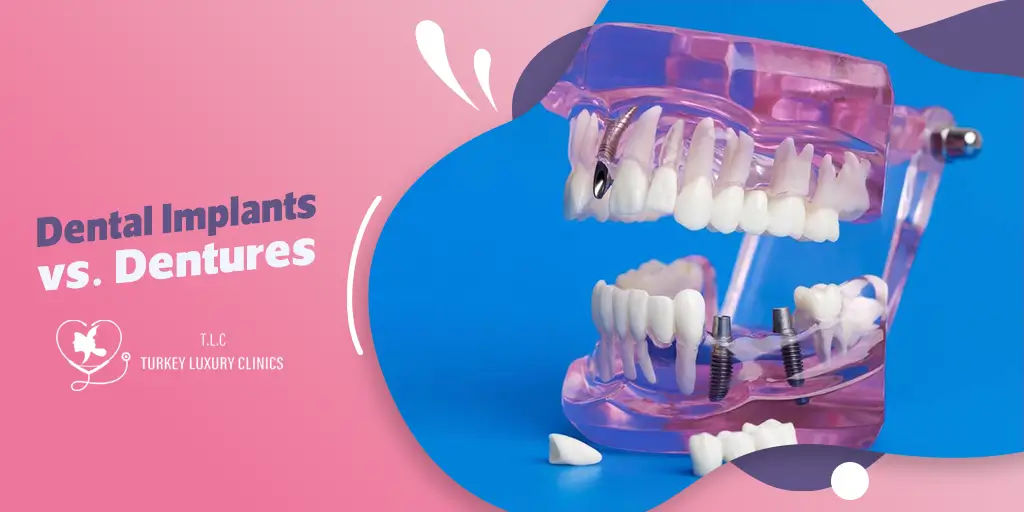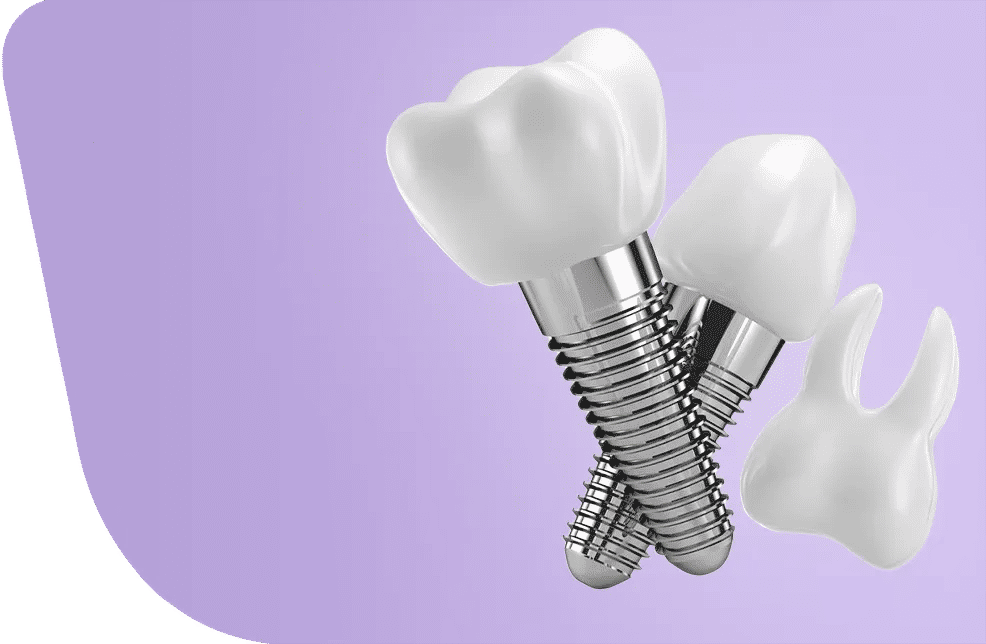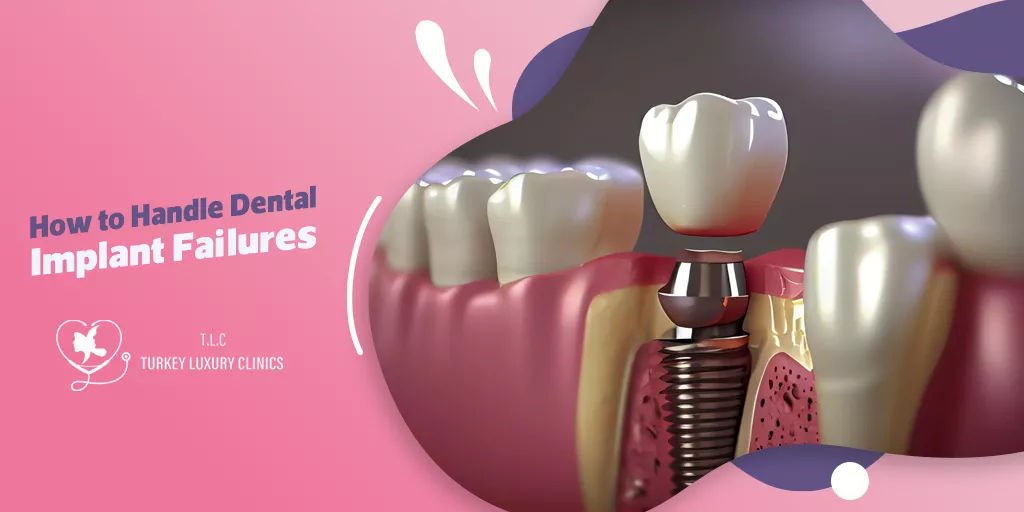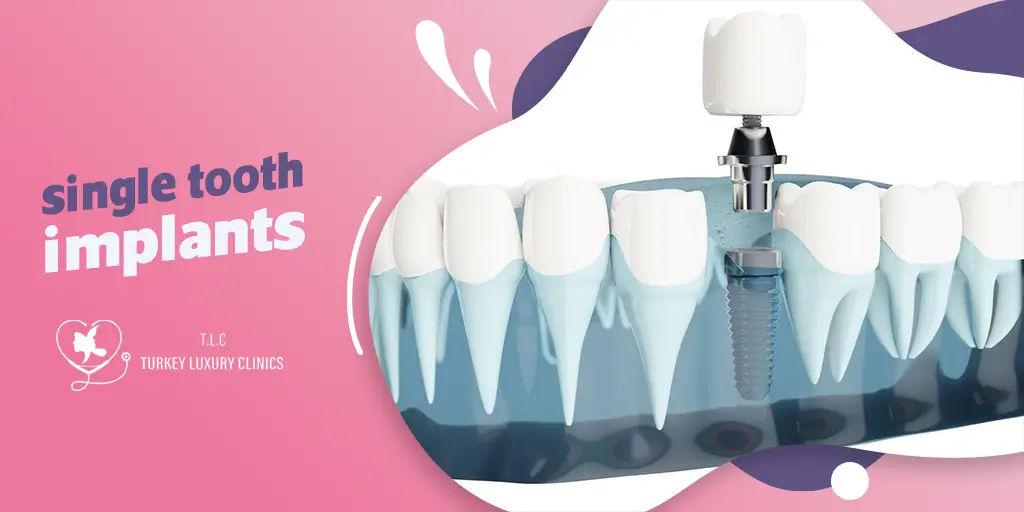- - Dental Implants vs. Dentures
- - What is Dental Implant?
- - What is a Dental Denture?
- - Dental Implants vs Partial Dentures
- - Permanent Dentures vs Dental Implants
- - Dental Implant vs Snap-On Denture
- - All-on-4 Dental Implants vs Snap-in Dentures
- - Full-Mouth Dental Implants vs Dentures
- - Dental implants vs Dentures Cost Comparison
- - Cost of Dental Implant vs. Dentures in Turkey
- - What to Consider When Choosing Between Implants and Dentures
- - Get Your Smile Restoration with Turkey Luxury Clinics
- - FAQs About Dental Implant vs. Dentures
Both dental implants and dentures are popular solutions for missing teeth, each offering diverse options. To choose between dental implants vs dentures, you should consider factors like cost, stability, durability, comfort, eating, and aesthetics.
Wondering about dentures or dental implants? Contact Turkey Luxury Clinics today to find out which solution is best for your smile!
Dental Implants vs. Dentures
Dental implants are permanent, surgically placed restorations anchored to the jawbone, offering superior stability, jawbone preservation, and a natural feel at a higher upfront cost, while dentures are removable, more affordable prosthetics made of acrylic or other materials that provide a temporary solution but require regular replacement and can shift during use.
What is Dental Implant?
Dental Implant: Involves the surgical placement of a titanium post into the jawbone. Over time, the post fuses with the bone to form a stable base for a crown, bridge, or even implant-supported denture, providing a permanent and secure solution for missing teeth.
Read about:
Are dental implants right for you? Understanding the benefits and considerations
Pros of Dental Implants vs Dentures
- Durability: Dental implants last a lifetime with proper care, unlike dentures that may need replacement every 5–7 years, making implants a long-term solution.
- Natural Appearance: Implants look and feel like natural teeth, providing a more natural smile compared to removable dentures.
- Enhanced Oral Health: Implants prevent bone loss and do not require special cleaning routines beyond normal oral hygiene, unlike dentures which can harbor bacteria.
- Comfort and Stability: Firmly anchored in the jawbone, dental implants provide better comfort and stability than dentures during eating and speaking.
Cons of Dental Implants vs Dentures
- Cost: Implants have a higher upfront cost than dentures, which may limit access for some patients.
- Surgical Procedure: Implant placement requires surgery, which is more invasive than denture fitting.
- Healing Time: The process of osseointegration can take months, whereas dentures are immediately usable.
What is a Dental Denture?
Denture: Consists of a removable oral prosthetic, typically made of acrylic, that rests on the gums. Dentures can replace a few teeth (partial dentures) or a full arch (complete dentures) and offer a non-surgical, more flexible option for restoring function and appearance.
Pros of Dentures vs Dental Implants
- Cost-effective: Dentures are an affordable option for tooth replacement, making them appealing to patients with limited budgets compared to dental implants.
- Non-invasive: Unlike dental implants, dentures do not require surgery, providing a simpler and less invasive solution.
- Easy to Repair: If dentures become damaged or ill-fitting, adjustments are quick and easy, unlike implants which require professional intervention.
- Reversible: Dentures offer a reversible solution for missing teeth, whereas implants involve permanent changes to the jawbone.
Cons of Dentures vs Dental Implants
- Stability: Dentures are less stable than dental implants, especially lower dentures, and can move while eating or speaking.
- Maintenance: Dentures require daily cleaning and proper handling to prevent bacteria buildup and maintain appearance.
- Replacement: Dentures typically need replacement every 5–7 years, which can increase long-term costs compared to implants.
Options and types of dental implants and dentures available
- Single tooth implant
- Full mouth teeth implants such as All-on-4 dental implants or All- on-6 implants
- Traditional full mouth dentures (removable)
- Permanent dentures (fixed and full mouth replacement)
- Dentures snap
Dental Implants vs Partial Dentures
Partial dentures are removable, tooth-supported appliances that are simple, less expensive, non-invasive and do not need high bone density, but they are less stable, can place stress on adjacent teeth and do not prevent bone loss in the jaw. Dental implants are permanent, have a more natural feel, improved bone health, and greater longevity but at a higher initial cost and need better overall health and oral and gum health. The choice depend on patient’s need, budget and patient’s health
Permanent Dentures vs Dental Implants
Permanent dentures are either removable or fixed dentures stabilized by implants.
Both permanent dentures and dental implants (usually All-on-4) use implants, but the key difference lies in permanence and design.
All-on-4 implants are fixed, anchored to the jawbone, providing security, bone preservation, and no need for adhesives or nightly removal.
permanent dentures, often called implant-supported dentures overdentures, may be removable snap-in appliances or a full set supported by a bar, requiring occasional removal for cleaning.
Dental Implant vs Snap-On Denture
Dental implants are fixed solutions anchored to the jawbone, providing maximum stability, natural feel, and long-term bone preservation. Snap-on dentures, in contrast, are removable, use fewer implants, and are less expensive, but they require more maintenance and may shift slightly during eating or speaking.
All-on-4 Dental Implants vs Snap-in Dentures
Snap-in dentures are the removable type of implant-supported overdentures,it is less expensive, and uses fewer implants to create a stable yet removable prosthetic. They require more maintenance but offer greater comfort than traditional dentures.
All-on-4 dental implants, in contrast, are a fixed, permanent set of teeth on four implants. They provide the highest stability, a natural feel, and preserve bone structure, but with a higher upfront cost.
The choice between them depends on your budget, desired permanence, maintenance commitment, and comfort needs.
Full-Mouth Dental Implants vs Dentures
For full-mouth restoration, patients often choose between full-mouth dental implants and full-mouth dentures, either removable or fixed.
All-on-4 dental implants, the most popular type of full-mouth dental implants, provide a fixed, permanent solution using just four strategically placed implants to support a full arch. They are highly stable, durable, and natural-looking, while also helping to preserve jawbone density. The procedure takes several months to complete and has a higher upfront cost, but these implants can last a lifetime with proper care.
Removable full-mouth dentures are a less invasive and more affordable option. They can be quickly obtained and restore aesthetics effectively but are less stable, may shift during eating or speaking, require adhesives, and do not prevent jawbone loss. Dentures typically need replacement every 5–7 years, potentially leading to future bone changes.
Related topics:
Dental Implants vs. Bridges: Finding the Best Solution for Your Unique Needs
Dental implants vs Dentures Cost Comparison
Dental implants are significantly more expensive upfront than dentures but are a long-term, permanent solution with a higher potential for longevity, while dentures are a more affordable, removable option that requires replacement every 5-7 years but does not prevent jawbone loss.
The cost for a single implant can range from $1,646 to $4,175, whereas traditional full dentures cost about $1,800, with options for both varying widely based on material and location.
Cost of Dental Implant vs. Dentures in Different USA Cities
Cost of Dental Implant vs. Dentures in Turkey
In Turkey, the cost of a single dental implant ranges from $400 to $1,500 USD, while a full set of removable dentures costs between $250 and $840 USD. Full mouth dental implants are a much larger investment, typically ranging from $5,200 to $12,600, whereas advanced hybrid implant-supported dentures cost around $2,400.
Dental implant and denture costs are significantly lower in Turkey than in the USA, with savings up to 70-85% for implants and dentures.
Cost of Various Types of Dental Implant vs. Dental Denture in the US and Turkey
What to Consider When Choosing Between Implants and Dentures
When deciding dental implants vs dentures, it’s important to consider several key factors that affect comfort, cost, and long-term results:
1. Eating and Chewing with Dental Implants vs Dentures
Dental implants are firmly anchored in the jawbone, providing stability that allows you to chew almost any food comfortably. In contrast, removable dentures can shift while eating, making sticky or hard foods challenging. Adjustments or adhesives may be needed for dentures to fit properly.
2. Durability and Longevity
Dentures typically last 5–7 years before needing replacement, while dental implants are a permanent solution that can last a lifetime with proper care. Choosing implants reduces the need for frequent replacements, making them a long-term investment in your oral health.
3. Aesthetics and Appearance
Implants look and feel like natural teeth and maintain the natural shape of your gums. Dentures may appear artificial and require regular adjustments. For patients seeking a natural-looking smile, dental implants are often the preferred option.
4. Cost and Budgeting for Dental Implants vs Dentures
Dentures are generally more affordable upfront, but ongoing maintenance and replacements can increase long-term costs. Dental implants have a higher initial cost, but they require less maintenance and rarely need replacement, making them cost-effective over time.
5. Comfort and Everyday Use
Dental implantsoffer a stable and secure fit, allowing for more comfortable eating, speaking, and daily activitiese. Dentures may move during speaking or eating, sometimes causing minor discomfort or embarrassment.
6. Maintenance Requirements
Dental implants are maintained like natural teeth, with regular brushing, flossing, and dental checkups. Dentures require daily cleaning, careful handling, and overnight soaking to prevent warping and maintain hygiene.
7. Bone Health Benefits
Dental implants stimulate the jawbone, preventing bone loss and preserving facial structure. Dentures do not provide this stimulation, which may lead to gradual bone resorption over time.
Get Your Smile Restoration with Turkey Luxury Clinics
Thinking about dental implants vs dentures? Turkey is a top destination for dental tourism, known for expert surgeons, world-class clinics, and affordable comprehensive dental packages. Our team at Turkey Luxury Clinics will guide you to the best solution for your smile. Contact us today to get started!













.webp)
.webp)
.webp)
.webp)

